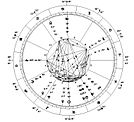- Electional astrology
-
Astrology Background History of astrology Astrology & astronomy Sidereal vs. Tropical Traditions Babylonian · Hellenistic Islamic · Western Hindu · Chinese More... Branches Natal astrology Electional astrology Horary astrology Mundane astrology More... Categories Astrologers Organizations Astrological texts Astrological writers Astrology Portal Electional astrology, also known as event astrology, is a branch found in most traditions of astrology in which a practitioner decides the most appropriate time for an event based on the astrological auspiciousness of that time.[1] It is distinct from horary astrology because, while horary astrologers seek to find the answer to a question based on the time the question was asked, electional astrologers seek to find a period of time which will result in the most preferable outcome for the event being planned.
Historically being used primarily to plan battles, electional astrology has been used by its proponents to plan a number of events, including weddings and trips.[2][3]
Contents
History
A rudimentary form of electional astrology was used by the Babylonians beginning sometime after the 16th century BCE. This and other Babylonian forms of astrology were passed on to the Persians, Egyptians, and Indians; although the Indians were the group that made the most use of it.[4] Early Vedic astrologers also used a sophisticated form of electional astrology known as Muhurta that was used for choosing the start of yajnas, travel, warfare, marriage etc.
Modern electional astrology, as well as most other astrology, can in general be traced directly back to Book 5 of Dorotheus's treatises on the subject. This is the oldest treatise on electional astrology.[5]
Practice
Main article: Event chartIn electional astrology, an astrologer is given an event the querent intends to plan. The astrologer then finds a date and time most auspicious for the event to take place, around which the querent bases the following plans. The method of coming to these conclusions is based on the relative positions of stars, planets and other celestial bodies at various times.[6] Each celestial body's placement means something particular to the tradition the individual astrologer is using, in combination with the natal chart of the querent.[7]
Branches
Elections, or predictions for auspicious times, are usually divided into three branches, which are used depending on the type of event being planned.[6]
Radical elections
Radical elections rest on the assumption that an election should be performed primarily based on the natal chart of the querent or person for whom the election is being performed. An underlying assumption of radical elections is that, because each person was born under different astrological conditions, the most auspicious time to hold an event will be different for each.[8]
Mundane elections
Mundane elections involve using prominent mundane horoscopes in force at the time for which the election is made.[9]
Ephemeral elections
The most commonly used and distinctive form of election is the ephemeral election. These involve picking a date for an event based on the position of the celestial bodies in the sky at the moment of the event. Most of the time, when a person is talking about electional astrology, that person is referring to ephemeral elections.[10] They can be described as "an horary chart set for a certain time in the future."[3]
Magical elections
Although astrology is not inherently connected with magic, ephemeral elections have been used in ancient and modern times to make talismans and seals. These items were seen to be imbued with the qualities of the auspicious date during which they were made, and their instruction is commonly found in medieval literature.[11]
References
- ^ http://www.astrologyweekly.com/astrology-articles/electional-astrology.php
- ^ http://www.horary.com/cse/elect1.html
- ^ a b Holden, James H. (2006). History of Horoscopic Astrology. American Federation of Astrologers. p. 15. ISBN 0866904638.
- ^ Holden, James H. (2006). History of Horoscopic Astrology. American Federation of Astrologers. p. 8. ISBN 0866904638.
- ^ Holden, James H. (2006). History of Horoscopic Astrology. American Federation of Astrologers. p. 43. ISBN 0866904638.
- ^ a b Robsen, Vivian E. (2004). Electional Astrology. Kessinger Publishing. p. 12. ISBN 9780766182370.
- ^ Robsen, Vivian E. (2004). Electional Astrology. Kessinger Publishing. p. 14. ISBN 9780766182370.
- ^ Robsen, Vivian E. (2004). Electional Astrology. Kessinger Publishing. pp. 14–18. ISBN 9780766182370.
- ^ Robsen, Vivian E. (2004). Electional Astrology. Kessinger Publishing. p. 18. ISBN 9780766182370.
- ^ Robsen, Vivian E. (2004). Electional Astrology. Kessinger Publishing. p. 20. ISBN 9780766182370.
- ^ Holden, James H. (2006). History of Horoscopic Astrology. American Federation of Astrologers. p. 149. ISBN 0866904638.
Categories:- Astrology by type
Wikimedia Foundation. 2010.

